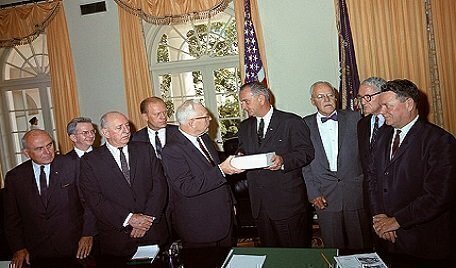On November 29, 1963, President Lyndon Johnson used his constitutional powers to issue an executive order to ask for a special commission to investigate John F. Kennedy’s assassination a week earlier.
 The seven-person commission was officially known as the President's Commission on the Assassination of President Kennedy. But it soon became known as the Warren Commission after the name of the group’s chairman, Chief Justice Earl Warren. Over the next nine months, it held public hearings, gathered evidence, and issued a controversial report on the Kennedy assassination and the death of alleged assassin Lee Harvey Oswald.
The seven-person commission was officially known as the President's Commission on the Assassination of President Kennedy. But it soon became known as the Warren Commission after the name of the group’s chairman, Chief Justice Earl Warren. Over the next nine months, it held public hearings, gathered evidence, and issued a controversial report on the Kennedy assassination and the death of alleged assassin Lee Harvey Oswald.
The use of executive orders by the President to accomplish special tasks dated back to the first President, George Washington, who established an early form of a presidential commission during the Whiskey Rebellion in western Pennsylvania.
The broader use of presidential commissions started under President Theodore Roosevelt, and the Roberts Commission was called by President Franklin Roosevelt to investigate the Japanese attack on Pearl Harbor.
In his executive order announcement, President Johnson named seven prominent figures to the commission: Warren, Senators Richard Russell and John Sherman Cooper, Representatives Gerald Ford and Hale Boggs, former CIA director Allen Dulles and Council on Foreign Relations chair John McCloy.
“Pursuant to the authority vested in me as President of the United States, I hereby appoint a Commission to ascertain, evaluate and report upon the facts relating to the assassination of the late President John Kennedy and the subsequent violent death of the man charged with the assassination,” Johnson said. “The Commission is empowered to prescribe its own procedures and to employ such assistants as it deems necessary.
In December 1963, Congress passed a resolution allowing the Warren Commission to call witnesses. At the same time, former Solicitor General Lee Rankin led a team of 15 attorneys who would organize the investigation. The Commission gathered evidence from the executive branch and the state of Texas, and it heard testimony from more than 500 witnesses.
The final Warren Commission report was sent to President Johnson on September 24, 1964. The group concluded that Lee Harvey Oswald was the lone assassin of President Kennedy and the killing was not part of a conspiracy. The Warren Commission also believed it was likely that Oswald shot three times at President Kennedy and Texas Governor John Connelly.
The Commission records are at the National Archives and most of the investigative records are now available to the public for inspection. The latest batch of files was released on November 17, 2017, under terms of the President John F. Kennedy Assassination Records Collection Act of 1992.







